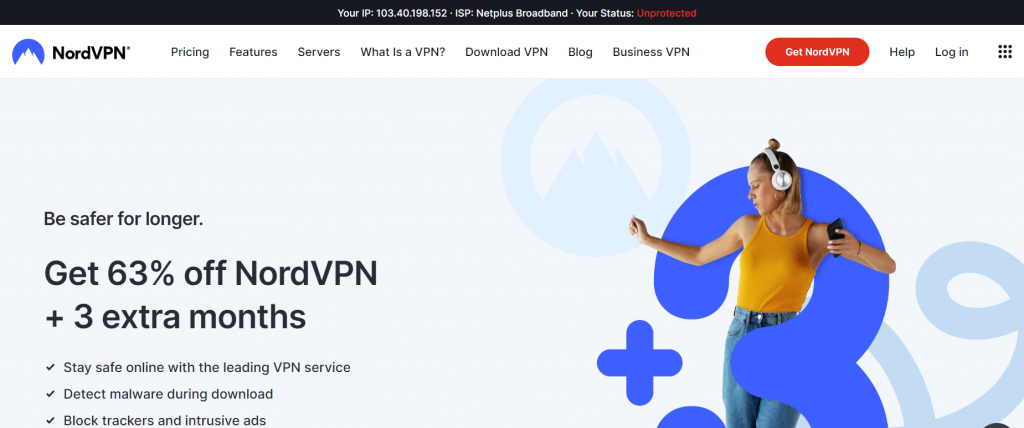
Introduction
Imagine sitting in a coffee shop sipping on your latte, scrolling through social media when suddenly you receive an email notification from your bank. You click to open it and enter your login details without a second thought. Little do you know, there’s someone sitting just a few tables away stealing all the information transmitted over the public Wi-Fi network. Scary, right? Public Wi-Fi is convenient but using it comes with risks that we often overlook. In this blog post, we’ll explore those risks and show you how a VPN can protect you from them. So put down that latte and let’s get started!
What is a VPN and how does it work?
If you’re like most people, you probably use public Wi-Fi whenever you can. It’s more convenient than using your data plan, and it’s usually free. But did you know that public Wi-Fi is one of the most insecure ways to connect to the internet? Hackers love public Wi-Fi because it’s easy to exploit.
But there’s a way to protect yourself from these hackers – by using a VPN. A VPN (Virtual Private Network) encrypts your internet connection, so even if someone is eavesdropping on your Wi-Fi connection, they won’t be able to see what you’re doing.
There are many different VPN providers out there, so it’s important to choose one that suits your needs. Some things to look for in a good VPN provider include:
-AES 256-bit encryption
-No logs policy
-High speed servers in multiple locations
-User-friendly apps for all devices
Once you’ve found a good VPN provider, all you need to do is sign up and download their app. Then, whenever you connect to public Wi-Fi, make sure to turn on your VPN and you’ll be protected from any potential hackers.
The risks of public Wi-Fi

Public Wi-Fi networks are insecure and open to attack. Hackers can easily set up fake Wi-Fi networks that mimic legitimate ones, allowing them to intercept your data. Even if the network is legitimate, the data you send and receive may not be private.
A VPN can protect you by encrypting your data and routing it through a secure tunnel. This makes it much harder for hackers to snoop on your traffic or intercept your data.
How a VPN can protect you on public Wi-Fi
A VPN can protect you on public Wi-Fi by encrypting your traffic and hiding your IP address. By encrypting your traffic, a VPN can make it impossible for anyone on the same network as you to snoop on your web activity. And by hiding your IP address, a VPN can prevent your ISP from tracking your online activity.
A VPN, or Virtual Private Network, is a secure tunnel between your device and the internet. When you connect to a VPN, all of your internet traffic is routed through an encrypted tunnel. This means that anyone trying to snoop on your web browsing will only see gibberish – they won’t be able to see what sites you’re visiting or what data you’re sending.
A VPN can protect you on public Wi-Fi in a few different ways. First, as we mentioned above, it encrypts your traffic so that anyone snooping on the Wi-Fi network won’t be able to see what you’re doing. Second, it hides your IP address from the websites you visit. This makes it more difficult for advertisers and hackers to track you online. Finally, a VPN can help protect against malware by acting as a filter between your device and the internet.
If you regularly use public Wi-Fi networks, we recommend connecting to a VPN whenever possible. By doing so, you can help protect yourself against some of the most common risks associated with public Wi-Fi.
The best VPNs for public Wi-Fi
It’s no secret that public Wi-Fi is not the most secure way to go online. In fact, it’s one of the riskiest things you can do. Hackers love to prey on unsuspecting victims who connect to public Wi-Fi hotspots, and they can easily steal your sensitive data or infect your device with malware.
But just because public Wi-Fi is dangerous doesn’t mean you should avoid it altogether. There are plenty of legitimate reasons to use public Wi-Fi, such as staying connected while you’re traveling or working in a coffee shop. The key is to take precautions and be aware of the risks.
One of the best ways to protect yourself when using public Wi-Fi is to use a Virtual Private Network (VPN). A VPN encrypts your traffic and routes it through a secure tunnel, making it much harder for hackers to intercept your data. It also hides your IP address, so you can browse anonymously and access blocked websites.
There are many different VPNs available, and it can be tricky to choose the right one. To help you out, we’ve put together a list of the best VPNs for public Wi-Fi. All of these VPNs offer strong security features and fast speeds, so you can stay safe and connected no matter where you are.
Get Best VPN Services With Nord VPN Website

If you’re like most people, you probably use public Wi-Fi whenever you can. It’s convenient and usually free. But did you know that public Wi-Fi is one of the least secure ways to connect to the internet? Hackers can easily set up fake Wi-Fi networks that look legitimate, but allow them to intercept your data. This can include everything from login credentials to credit card numbers.
A Virtual Private Network (VPN) encrypts your data and routes it through a secure server, making it much more difficult for hackers to access. And while no security measure is foolproof, using a VPN significantly lowers your risk of being hacked on public Wi-Fi.
If you’re looking for a VPN service, Nord VPN is a great option. With over 5,000 servers in 62 countries, Nord VPN offers a fast and reliable connection. And their strict no logs policy ensures that your data remains private. You can get started with Nord VPN for as little as $2.99 per month.





